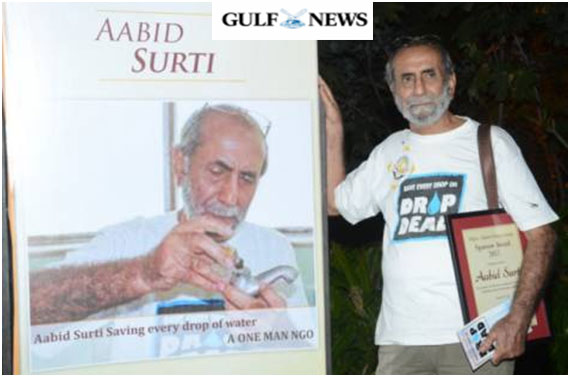GULF NEWS
11th July 2013
Aabid Surti: Drop Dead is my biggest achievement
(Special to Weekend Review)
He may be a well-known artist and writer but these days he is preoccupied with dripping taps and the need to conserve water
Archisman Dinda,
- Aabid Surti is a National Award-winning author, artist, cartoonist and playwright. But when asked about his biggest achievement in life he believes it is his non-governmental organisation — Drop Dead — which has fixed thousands of leaking taps and kept billions of litres of water from being wasted.
This Sunday is no different for the 77-year-old as he fixes leaking taps for free, in the Mira Road suburb where he lives, in Mumbai, India. Drop Dead, has just one employee, one volunteer and one inspiration — him. “Lots of water saved. Hundreds of people are made aware of the need to save water. And for all the hard work, we are sometimes offered free lunch,” he says. Surti started Drop Dead Foundation in 2007 after a leaking tap at a friend’s house bothered him so much that it became his cause.
Born on May 5, 1935, in Gujarat, Surti obtained a Diploma in Arts from the Sir JJ Institute of Applied Art in 1959. He published his first story “Tootela Farishta” (Fallen Angels) in Gujarati in 1965. Since then, Surti has written numerous short stories, novels, plays, children’s books, comic books, and travelogues. In 1993, he won a National Award for his short-story collection “Teesri Aankh” (third eye).
What inspired you to start Drop Dead?
We are originally from Gujarat. During the Partition in 1947, everybody said that we have to leave for Pakistan, since we are Muslims. Initially we decided to leave, but after reaching Bombay, my father said that whatever may come we will stay back in India, even if we had to die.
My childhood was spent mostly in Bombay’s slums and on pavements. To get a bucket of water from the common tap, my mother had to stand in the queue early in the morning and often she had to fight for her share. This childhood memory kept on haunting me whenever I saw a leaking tap, an overflowing tank, or a bursting pipeline.
Once I went to my friend’s house and saw a leaking tap. When asked, he said that it is very difficult to get plumbers to do such a small job. A few months later when I went back, the tap was still leaking. That made me think about starting this organisation.
I read an article that if one drop of water is wasted every second, 1,000 litres go down the drain every month. An image of 1,000 bottles of water flashed before my eyes. I couldn’t ignore it.
What are Drop Dead’s activities?
It all started in 2007, coincidentally the international year of water. Every Monday, the plumber, a volunteer, and I approach the secretary of a society for permission to fix leaking taps. If the secretary agrees, then we put up posters on the housing society’s noticeboard, on the ground floor or near the lift, with our tagline “Save Every Drop or Drop Dead”. Generally everybody agrees, since everyone understands the problem, but they consider it too minor or too expensive to take immediate attention. The words “Drop Dead” have a great impact on the tenants.On Saturdays, we send pamphlets that explain what Drop Dead is to every resident of the society, so when we arrive on Sunday morning, we get a warm welcome from the members of the housing society. We cover a six-storey building in about three hours. We spend only 10 to 15 minutes travelling by car to reach a targeted building, but the rest of the time, we go from house to house correcting leaky taps.
How do you fund this activity?
Initially, I started with my Rs100,000 [Dh6,037] prize money of the Hindi Sahitya Sansthan Award I received from the Uttar Pradesh government for my literature to kick off this mission. Later, Rs 50,000 was given to me as prize money again for my literature from Maharashtra Government. Every Sunday, we spend around Rs 600 on fixing taps. Mostly it is because of a faulty washer, which we replace at our cost, a mere 50 paise [3 fils] each if bought in wholesale. If any other major replacements are needed, we generally ask the owner of the house to get us spare parts and we do the job for free.
The plumber’s charges and the commute are the real cost of the service. To raise money and to take this initiative to other places, I print T-shirts with Drop Dead logos and sets up stalls at exhibitions and fairs. I spend Rs100 to get a T-shirt made. I ask the buyers to pay me anything above Rs100. Some pay Rs110, some Rs1,000! When you honestly set out to do good for others, the whole universe is there to back you. Not only that, God becomes your fundraiser. When my finances are about to dwindle, Allah pokes the right person and I receive a cheque without asking. This year, Wipro, the Indian information technology giant, gave the Sparrow Award worth Rs50,000 for Drop Dead.
Some well-wishers have also helped us. For example, an owner of a press offered to print pamphlets for free. I asked him to not be foolish. But the proprietor was adamant. Of course, contributions from anyone with no strings attached are always welcome.
What are Drop Dead’s accomplishments so far?
I’ve kept the record of our first year only. During February 2007 to February 2008, we visited 1,666 houses on Mira Road, fixed 414 leaking taps free of charge, and saved about 414,000 litres of water. The response to Drop Dead has been unbelievable. It’s picking up fast like jungle fire, not only in India but all over the globe.
How do people react when they see a National award winner going around fixing taps?
My popularity as an artist is our real strength. I want to remind people, that no matter how busy or important you may be in life, it is equally important to pay attention to small things in our day-to-day lives which will secure our tomorrow.
Through our work, I have realised that it is not that people are ignorant about the world around them but they need to be reminded of their responsibilities as a social being, where saving a drop of water is as important as saving a rupee. You may not be able to save the Ganges or the Yamuna from where you are but you can save a few drops here and there, and those few drops count. I think Allah has given me that responsibility, and I am doing that happily.
I am sacrificing my Sunday mornings for this cause. It’s so simple, so easy for anyone to do it. And that is what I want to convey to all, especially to senior citizens: come out of the retirement cocoon, spend a couple of hours, just do it. If I can, you can.
What are your plans for Drop Dead?
On the immediate to-do list is to hire an office space and more staff, and get a two-wheeler for the plumber to attend to emergency leaks. But the major challenge is to spread the movement to other parts of the country, through local volunteers. I am looking for people who are interested in this. I am ready to give them my logo and everything else. I don’t even want my name on their material. All I want them to do is help save water.
I’ve already started motivating children. The Cosmopolitan School of Mira Road and its staff members are committed to conserve water. Its thousand-plus students are my angels who are carrying forward the message to save water by undertaking campaigns and putting up Drop Dead posters in their buildings.
Media is a very important tool in spreading my message. People should read about the initiative and take things forward in their locality. Nobody needs to pay me a royalty for that, they just need to save water!
(Archisman Dinda is a journalist based in Kolkata.)

